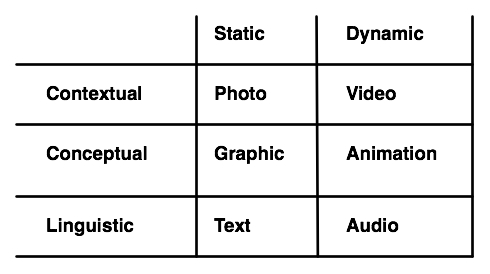The other day John Ittelson stopped by for a visit. I think of him as the guru of video usage in elearning, not least because of the recording studio he built in his house! He mentioned his use of Flip camcorders, and finally a piece clicked into place that had been floating around in my thoughts.
 I’ve had a slight blindspot for photos and video because I peg the ‘conceptual’ meter. I recognize the value, though I don’t play with the files enough (tho’ I took a digital audio/video editing course more than a decade ago, and recently edited home videos for my wife’s birthday). Photos and videos are really good for contextualizing, and that’s particularly valuable for examples (and practice).
I’ve had a slight blindspot for photos and video because I peg the ‘conceptual’ meter. I recognize the value, though I don’t play with the files enough (tho’ I took a digital audio/video editing course more than a decade ago, and recently edited home videos for my wife’s birthday). Photos and videos are really good for contextualizing, and that’s particularly valuable for examples (and practice).
The revelation was about the value of having learners capture information in situ, and sharing this for a variety of reflective opportunities. The information captured can be performances, products, whatever. It could also be interviews, or thoughts.
A colleague’s wife used to take an iPod with a microphone to conduct interviews. Gina Schreck discussed giving groups of employees Flips to make videos of what their business unit does for the org, to share. John mentioned capturing samples of teaching to share. Having captures of actual practice is a valuable tool around which to scaffold discussion, and a powerful tool for reflection. You can capture someone’s stories of best practices, or your own performance to review.
Note that making both other’s and personal captures available opens up the opportunity to learn more with and from others than your own reflective observations will provide, if you can be that open. As a learning facilitator, you should provide ways for individuals and groups to capture and share thoughts, actions, events, and more.
One of the powerful things in digital performance environments (read: games, er, immersive learning simulations, and virtual worlds as was part of the discussion the other day) is the ability to capture records of action for review, too. So look at ways to digitally track activity in learning environments (another reason to make the alternative to the right choice to be a reliable misconception!).
Reflection is powerful, and digital tools give us ways to truly leverage that power. Reflect on that!